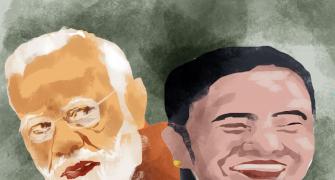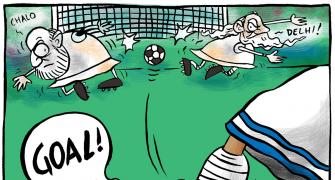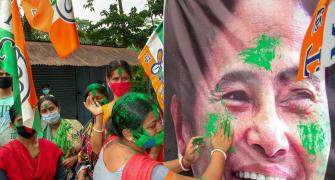She's the soldier, she the commander and she the army.

The distinction between Mamata Banerjee the leader and Trinamool Congress the party evaporated into nothingness as she conquered West Bengal fighting the Bharatiya Janata Party’s election war machine led by Prime Minister Narendra Modi and Home Minister Amit Shah almost single-handedly.
The victory for Banerjee, by far the biggest mass leader since the redoubtable Jyoti Basu who ruled West Bengal with an iron fist from 1977 to 2000, will not only help fortify her position in the state but also enhance her standing at the national level where voices from the Opposition are getting feeble with time.
A masterful practitioner of modern-day politics, she has wielded considerable influence beyond her own state, in the corridors of power in New Delhi, for a long time, sewing up alliances with both the Congress and the BJP.
Since leading thousands of hungry, half-clad and angry farmers on the dusty streets of Singur and Nandigram over a decade ago, she ruled the state virtually unchallenged for eight years before the BJP vastly extended its influence and won 18 of the state's 42 Lok Sabha seats in 2019.
For the 66-year-old spinster, the political journey from the restive alleys of Nandigram and Singur in 2007-08, when she waged a relentless battle against the Left Front government, to 'Nabanna', the seat of power in Kolkata, was as captivating as it was punishing.
Although she cut her teeth in politics as a young Congress volunteer in her student days and rose to become a minister in the United Progressive Alliance and the National Democratic Alliance governments, it was in the crucible of Nandigram and Singur movements against forcible acquisition of farm land by the Communist government for industrialization that her destiny and that of the TMC took shape.
She founded the TMC in January 1998 after parting ways with the Congress and it was through struggles, big and small, against the Communist dispensation that her party grew.
In 2001, when the state had its first assembly polls after the launch of the TMC, the party bagged an impressive 60 seats in the 294-member House, while the Left Front clinched a staggering 192.
In its second outing in the 2006 assembly elections, the TMC's strength came down by half as it could pocket only 30 seats, while the Left scored a resounding victory with 219.
The four years that followed were the most momentous in the contemporary political history of West Bengal as she put up a spirited fight against the Left Front government over alleged excesses in Singur and Nandigram.
The assembly elections of 2011 were historic, as she decimated the Left in one of its longest-standing bastions. Banerjee's party ended the Left Front's 34-year unbroken stint in power, winning a whopping 184 seats, riding a massive public outrage against the communists, who were restricted to just 60 seats. It was then the longest-serving democratically elected communist government in the world.
But power has many pitfalls and rising aspirations is one of them. A string of influential TMC leaders including Suvendu Adhikari, the MLA from Nandigram and a minister, deserted Banerjee and joined the BJP.
Born into a Bengali Brahmin family, Banerjee, as a young Congress activist, formed 'Chhatra Parishad' unions in colleges.
She rose through the Congress ranks rapidly and was called a giant slayer when she defeated CPI-M heavyweight Somnath Chatterjee in Jadavpur in the 1994 Lok Sabha elections held in the aftermath of the then prime minister Indira Gandhi's assassination.
She lost the seat to Malini Bhattacharya in 1989, when an anti-Congress wave swept the country after the Bofors scandal came to light, the only time she lost an election.
She won the Kolkata South Lok Sabha seat in 1991 which she retained in 1996, 1998, 1999, 2004 and 2009.
As minister of state for sports in the P V Narasimha Rao government, the quick tempered leader announced her resignation and held a rally in Kolkata's Brigade Parade Ground against what she believed was government's neglect of sports. She was divested of all her portfolios including women and child welfare and human resource development in 1993.
In 1996, she accused the Congress of behaving like a "stooge" of the Left and founded the Trinamool Congress in 1998.
She joined the NDA in 1999 and was appointed the railway minister in Atal Bihari Vajpayee government, and launched new trains and rail projects in West Bengal.
Banerjee quit the NDA in 2001 in the aftermath of the Tehelka expose, which brought under cloud several ministers in the Vajpayee government, and aligned with the Congress again the same year.
She was back in the NDA in 2003 and was appointed the coal and mines minister in 2004.
She contested the Lok Sabha elections in 2004 as part of the NDA and her party lost badly. She was the lone Lok Sabha MP of the TMC from West Bengal.
In 2006, the TMC fared abysmally in the state assembly elections.
Before the 2009 Lok Sabha polls, she joined the Congress-led UPA and the alliance won 26 of the state's 42 seats. She was beck as the railway minister.
As public outrage grew over the Left Front government's crackdown on protests in Nandigram that killed 14 people and injured scores more in police firing, Banerjee's popularity grew exponentially.
Singur and Nandigram became emblematic of mass resistance against the communist rulers, and in 2011 assembly elections, the TMC won a landslide. The TMC-Congress-SUCI alliance won 227 of the 294 seats.
After being sworn in as the chief minister on May 20, 2011, one of the first decisions of her government was to return 400 acres of land acquired by the governent for Tata Motors Nano project to the farmers. The Tatas had already exited Singur.
Banerjee launched a slew of welfare projects in health and education sector and for empowerment of women, and tried to strengthen the law and order machinery by setting up police commissionerate in Howrah, Bidhannagar, Barrackpore and Durgapur-Asansol.
The BJP, rapidly expanding its influence in the state at the Left's expense, accused her of minority appeasement after she instituted a stipend for thousands of imams and muezzins of mosques. The Kolkata high court called it unconstitutional and stopped payment.
She earned the BJP's wrath when she banned the immersion of Durga idols in October 2016 till after observation of Muharram by Muslims.
Ministers in the Banerjee government and key TMC leaders got embroiled in the Saradha and Rose Valley chit fund scam cases. Quite a few were jailed.
Though these allegations indeed chip away at Banerjee's popularity reflected in the BJP's impressive showing in the 2019 Lok Sabha polls, nothing stuck in the assembly elections.
'Didi' became the real 'Dada' as she got past the post, on a wheelchair and a foot in cast, a souvenir from the Nandigram battle against former protege-turned-rival Suvendu Adhikari.









